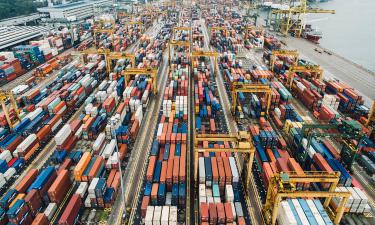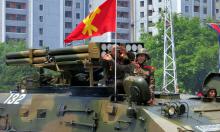Commonwealth of Independent States: Yesterday, Today, Tomorrow
The main political subject on the pages of the Russian newspapers is the summit of the leaders of the countries included in the Commonwealth of Independent States, which has recently taken place in Moscow. The summit summed up the results of the decade of its existence and planed results for the future.
All leaders of the CIS countries took part in the summit, even President of Azerbaijan Geydar Aliyev, who was sick. Although the summit celebrated ten years of the existence of the commonwealth, the participants were not really in high spirits. They all realized that the main motto of the previous decade “Integration at any cost” is out of date and now it is much better to put it as follows: “Integration for the sake of profit.”
“The key for the development of the general understanding of the future tasks and objectives of the Commonwealth is pragmatism,”- the “analytical report” says (the report was passed as the final document). In other words, Russia is not really happy with the present state of things in the CIS, and it is looking for a way to elaborate a new approach to the relations with its close neighbors. It should be mentioned that economic cooperation is in the center of the report and not the military or political cooperation. The report also acknowledged the difficulty for Russia to integrate with Belarus or Central Asia due to significant differences in the direction of the economic reforms in each separate country and other reasons.
The report actually said that the major goal of the economic cooperation was joint integration into the world community, where the CIS countries will become close competitors due to the similar structures of their exports (oil, gas, metal, weapons). The idea of establishing a peculiar EU on the base of the commonwealth was successfully buried. The issue pertaining to the establishment of the free trade zone within the framework of CIS was not seriously supported because of the fact that the mutual commerce is not balanced. Specialists calculated, Russia annually lost from three to four percent of the GDP as a result of the evident and secret funding. This is too much for Russia, a country with a huge debt inherited from the former Soviet Union. This is about the economic part of it. The political, or the military-political issues better to say, have much more to think about.
The new Russian leadership offered its partners to make choices without “the political imperative” of the existence of the Commonwealth, which was typical for the past. Russia “de facto” refused from the imperial ambitions, which cost it a lot. Now Russia offers a choice to all the interested parties. The country is not going to keep anyone in the CIS by force.
Russia offered a choice to the former republics, but it also preserved a right to protect its interests in any regions of the former USSR. Moscow does not lose anything in this situation. It does not matter what the leaders of the former Soviet republics have to say, as they perfectly realize that they can not do without Russia’s help.
Even the republic of Kazakhstan, which seems to be rather wealthy with its rich oil and gas reserves, can not export these resources without Russia’s help: the Caspian Pipeline Consortium is controlled by Russia.
It was announced at the summit that Russia and Kazakhstan came to a compromise regarding the Caspian shelf. Everyone knows how relevant this issue is in the relations between Russia, Kazakhstan, Azerbaijan, Turkmenistan, and Iran. Nevertheless, Russia does not have the energy for providing democracy on the huge territory of the former USSR.
Dmitry Litvinovich PRAVDA.Ru
AP photo: Presidents of state members of CIS (Commonvealth of Independent States) walk for the summit in Kremlin's St. Vladimir's Hall on Friday, Nov. 30, 2001
Read the original in Russian: http://www.pravda.ru/main/2001/12/03/34462.html
Translated by Dmitry Sudakov
Subscribe to Pravda.Ru Telegram channel, Facebook, RSS!



